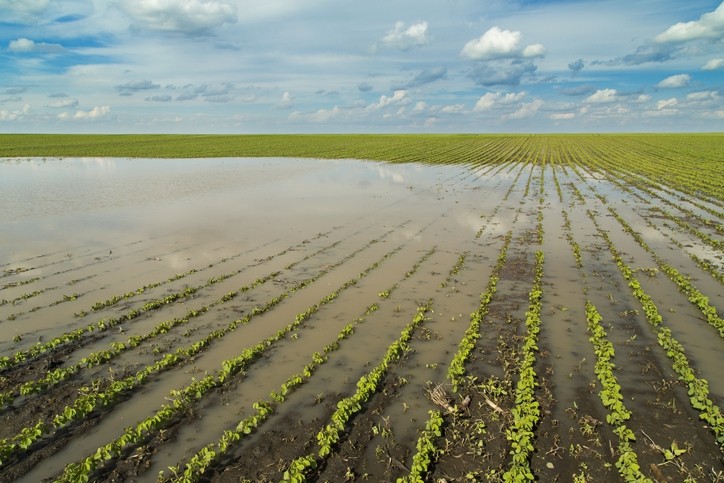More extreme weather, continued shipping delays raise risks in botanical ingredient supply chains

Shipping delays, unpredicted increases in demand
A primary stressor at the moment is the continuing dislocation in transportation systems. Dozens of container ships are stacking up at ports like Long Beach, CA for as long as two weeks waiting to unload. On the back end, there is a critical shortage of truckers to move the containers from the ports, meaning even once unloaded a container might not move again for many days waiting for a driver.
Other disruptions had to do with port closures in China. The Chinese government, in an effort to keep virus cases to an absolute minimum, has closes some ports for days on end when a COVID-19 infection was reported among dock workers. Those kinds of delays reverberated through an already discombobulated system.
Pandemic shifted demand to goods and away from services
In addition to what the pandemic took away in terms of lost man hours, part of the problem is what it added. Stimulus funds in the United States and Europe gave consumers cash to spend. With no services to spend it on because of lockdowns they turned to goods, causing a huge uptick in the demand for container space, a surge shippers had not foreseen and for which they were unprepared.
Many economists believe the issue will more or less solve itself. Marci Rossell, PhD, said at the annual meeting of the Council for Responsible Nutrition a few weeks ago said she expects that drivers who left the trucking industry during the pandemic will return once wages rise enough to become attractive once again.
Others are not so sanguine that the system can be left to itself. Yesterday the US House of Representatives passed a bill aimed at easing the logjam, and making it easier for US exporters to access containers at a reasonable cost. Part of the issue that the bill aims to address is the mismatch between underutilized containers going back to Asia and loaded ones inbound, which are much more lucrative for shipping companies.
increasing inventory to account for delays
Steve Yeager, director fo quality and regulatory affairs for supplier Mountain Rose Botanicals, said this pandemic time has been one of the most challenging interludes of his career in the botanical supply trade. Mountain Rose sources more than 400 different botanicals from all parts of the globe, and the shipping crisis has made planning more difficult. It’s not that supplies are short, but rather that the timing of shipments is no longer reliable.
“Luckily our supply chains are pretty secure because we have long standing relationships with our suppliers,” Yeager told NutraIngredients-USA. “But things have just gotten months behind because fo the ports.“
Dale Perrott, chief supply officer of finished products manufacturer Traditional Medicinals, said the pandemic has caused a shift in how the company thinks about its shipping and ordering practices. Traditional Medicinals offers wide range of herbal teas sold as dietary supplements and other products.
“Overall in our supply chain we’ve had to have a pretty significant shift in our risk assessment. The mantra used to be ‘just in time’ and now ‘it’s just in case.’ We are increasing what we hold in inventory,” Perrott said.
Perrott said when planning for shipments from China it has always been necessary to plan for the Chinese New Year holiday period. The season formally lasts from the beginning of February to mid month. In mainland China and other ethnic Chinese communities in East Asia many workers travel to their hometowns for days or weeks. That annual slowdown could be magnified in this unusual year, he said.
Josef Brinckmann, senior research fellow for Traditional Medicinals, said the new realities will mean companies will have to change how they do their inventory planning.
“The disruptions during the pandemic have shown that just in time doesn’t work any more. I’m contracting for shipments a couple of years out and I need six months of inventory in or near house at all times. You have to build in a few months uncertainty around shipping and you have to plan for having the space to house that inventory,” he said.
Warmer, less predictable world
On a longer view, the ongoing process of climate change is affecting how companies that source botanical ingredients view future risk.
According to one of the world’s leading reinsurance firms, MunichRe, losses attributable to severe weather events have exceeded $5.2 billion since 1980, and the company notes that few of those losses were insured.
The company notes that global data shows indisputably that temperatures are rising and now average more than 1 degree C above the hundred-year average. Climate scientists theorize that the consistently higher temperatures means a more energetic, unstable atmosphere. That drives weather catastrophes like droughts, bigger wildfires and massive rainfall events that flood cities and destroy crops.
“Individual loss events cannot be attributed directly to climate change. Nevertheless, the analysis of long-term trends on the basis of meteorological data – in combination with underwriting and socio-economic data – provides key indications of the changing risk from dangerous storms,” the company notes.
Spreading the risk
Botanical industry professional Shaheen Majeed said some companies have been planning for weather-related supply disruption for some time.
“For instance with turmeric, the majority of the world’s supply comes from what we’d call the ‘turmeric belt’ in southern India,” Majeed said.
A recent report by the Royal Meteorological Society noted that monsoon variability is likely to increase in the future with the warming of the Indian Ocean, meaning extreme rain events as well as droughts are more likely in the future.
“There is more risk involved now. Companies should start looking at other areas where they might source things in the future if they haven’t already,” Majeed said.
Extreme weather could drive political instability
And a recent report in the journal Environmental Science and Pollution Research notes that climate change will likely act as a ‘threat multiplier,’ causing areas of the globe already suffering from political instability to become even less stable in the future.
Brinckmann said even before the global climate change alarms started to sound Traditional Medicinals has been planning for these kinds of events. The dislocations arising from the 911 attacks and the subsequent institution of the Bioterroism Act requirements alerted the company to the risks inherent in a thin supply chain.
“Our policy of spreading risk dictates that for each botanical we want to have at least two or three or maybe even four distinct production bases. And we’d want those to be in different agroclimatic zones and different geopolitical zones,” Brinckmann said.
For all of that planning and sourcing, it helps to have experience and the relationships that come with that, Brinckmann said.
“All of this might be hard for some of the smaller and newer companies in the business,” he said.
















